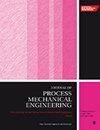Prediction of friction stir welding performances of dissimilar AA3003-H12 and C12200-H01 using machine learning algorithms
IF 2.2
4区 工程技术
Q2 ENGINEERING, MECHANICAL
Proceedings of the Institution of Mechanical Engineers, Part E: Journal of Process Mechanical Engineering
Pub Date : 2024-09-05
DOI:10.1177/09544089241272824
引用次数: 0
Abstract
Tests specimens were prepared by friction stir welding of two dissimilar metals aluminum and copper. The specimens were subjected to mechanical tests to calculate the ultimate tensile strength, yield strength, percentage elongation, and impact energy. Four different machine learning algorithms (AdaBoost, CatBoost, Gradient Boosting, and XGBoost) were applied for developing the ML models in predicting the performance parameters such as ultimate strength, yield strength, percentage elongation, and impact energy. Pin type, weld speed, rotational speed, and shoulder diameter were considered as the input parameters for the model. Training, testing, and validation were carried out by considering 60%, 20%, and 20% of the available data respectively. In terms of accuracy (lower MAE, lower RMSE, greater R使用机器学习算法预测异种 AA3003-H12 和 C12200-H01 的搅拌摩擦焊接性能
通过对铝和铜这两种异种金属进行搅拌摩擦焊接,制备了试样。对试样进行了机械测试,以计算极限拉伸强度、屈服强度、百分比伸长率和冲击能量。四种不同的机器学习算法(AdaBoost、CatBoost、Gradient Boosting 和 XGBoost)被用于开发 ML 模型,以预测极限强度、屈服强度、伸长百分比和冲击能等性能参数。模型的输入参数包括销钉类型、焊接速度、旋转速度和肩部直径。分别使用 60%、20% 和 20% 的可用数据进行了训练、测试和验证。在预测极限拉伸强度、屈服强度、百分比伸长率和冲击能方面,CatBoost 模型、梯度提升模型和 XGBoost 模型的准确性(更低的 MAE、更低的 RMSE、更大的 R2 值和更低的 AAD%)优于 AdaBoost 模型。与其他模型相比,AdaBoost 模型只有很少的超参数可供微调。在超参数调整过程中,AdaBoost 模型仅在很小的特征值范围内显示出准确性。
本文章由计算机程序翻译,如有差异,请以英文原文为准。
求助全文
约1分钟内获得全文
求助全文
来源期刊
CiteScore
3.80
自引率
16.70%
发文量
370
审稿时长
6 months
期刊介绍:
The Journal of Process Mechanical Engineering publishes high-quality, peer-reviewed papers covering a broad area of mechanical engineering activities associated with the design and operation of process equipment.

 求助内容:
求助内容: 应助结果提醒方式:
应助结果提醒方式:


